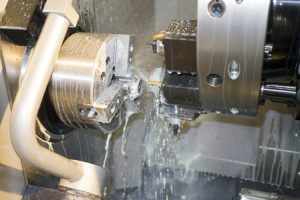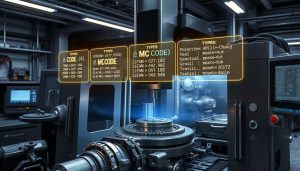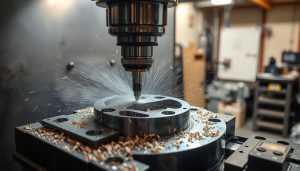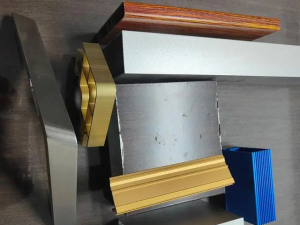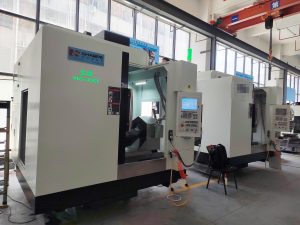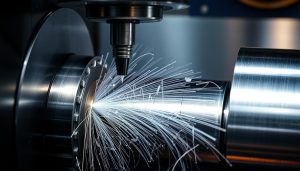In the dynamic world of modern engineering manufacturing, the rise of advanced machining technologies has ushered in a new era of complex Computer Numerical Control (CNC) parts. These intricate components, crafted with unparalleled precision and attention to detail, are the backbone of cutting-edge industries, from aerospace to medical devices. As the demand for innovative solutions continues to grow, understanding the nature of complex CNC parts has become paramount for manufacturers and engineers alike.
At the heart of this technological revolution are the skilled artisans and engineers who leverage the power of CNC machining to bring their designs to life. By harnessing the latest advancements in computer-controlled machining, they are able to create parts with unprecedented levels of complexity, pushing the boundaries of what was once deemed possible. From delicate medical implants to high-performance automotive components, these complex CNC parts are transforming the way we approach engineering manufacturing.
Defining Complex CNC Parts
In the realm of engineering manufacturing, complex CNC (Computer Numerical Control) parts are the epitome of precision and innovation. These intricate components are characterized by their intricate designs and tight tolerances, posing unique challenges for manufacturers.
Characteristics of Complex CNC Parts
Complex CNC parts are defined by their intricate geometries and advanced features. They often incorporate detailed contours, specialized cavities, and intricate surface patterns that require precise machining techniques. These parts are engineered to meet strict performance and quality standards, with minimal room for error.
Intricate Designs and Tight Tolerances
The hallmark of complex CNC parts is their intricately designed features and the tight tolerances required for their production. Manufacturers must navigate the complexities of these parts, ensuring that every detail is executed with the utmost accuracy. From minute surface finishes to the seamless integration of internal components, the pursuit of perfection is a constant challenge in the world of complex CNC manufacturing.
| Characteristic | Description |
|---|---|
| Intricate Designs | Complex CNC parts often feature detailed contours, specialized cavities, and intricate surface patterns that require precise machining techniques. |
| Tight Tolerances | These parts are engineered to meet strict performance and quality standards, with minimal room for error in their manufacturing process. |
“The pursuit of perfection is a constant challenge in the world of complex CNC manufacturing.”
Factors That Make CNC Parts Complex
When it comes to engineering manufacturing, not all CNC parts are created equal. Certain factors contribute to the complexity of CNC parts, making them more challenging to design, fabricate, and assemble. Understanding these key factors is crucial for successful CNC machining projects.
Geometry and Shape Complexity
One of the primary drivers of CNC part complexity is the geometry and shape of the component. Intricate designs with tight tolerances, multiple angles, and complex curves require advanced CAD/CAM software and highly skilled CNC machinists to produce accurately. Geometry complexity often necessitates the use of multi-axis machining techniques to achieve the desired form.
Material Selection for Complex Parts
The choice of material for a complex CNC part can also significantly impact the manufacturing process. Exotic, high-performance materials like titanium, Inconel, or specialized alloys may possess superior properties but can be challenging to machine due to their material selection characteristics, such as hardness, brittleness, or susceptibility to deformation.
Multi-axis Machining and Internal Features
Producing complex CNC parts often involves the use of multi-axis machining techniques, which allow for the creation of internal features, undercuts, and other intricate details that would be difficult or impossible to achieve with traditional 3-axis machining. These advanced machining methods require specialized equipment, tooling, and programming expertise to execute effectively.
| Factors | Impact on CNC Part Complexity |
|---|---|
| Geometry Complexity | Intricate designs, tight tolerances, and complex curves necessitate advanced CAD/CAM software and multi-axis machining. |
| Material Selection | Exotic, high-performance materials like titanium and Inconel can be challenging to machine due to their physical properties. |
| Multi-axis Machining | Enables the creation of internal features, undercuts, and other intricate details that are difficult to achieve with traditional 3-axis machining. |
Navigating the complexities of CNC part manufacturing requires a deep understanding of these key factors. By carefully considering geometry, material selection, and advanced machining techniques, engineers and manufacturers can overcome the challenges and produce exceptional, high-quality CNC parts.
Techniques for Machining Complex Parts
Crafting intricate and high-precision CNC parts requires advanced manufacturing techniques. These cutting-edge methods ensure that complex geometries, tight tolerances, and demanding materials are handled with unparalleled accuracy and efficiency.
Advanced CNC Machining Methods
Today’s CNC machining capabilities go far beyond traditional milling and turning operations. Manufacturers leveraging advanced CNC machining can produce complex parts with remarkable precision. Techniques like multi-axis machining, Swiss-type turning, and electrical discharge machining (EDM) allow for the seamless fabrication of parts with intricate features and complex shapes.
Precision and Accuracy in Complex CNC Manufacturing
Achieving precision manufacturing is crucial when working with complex CNC parts. Advanced control systems, high-quality tooling, and rigorous quality control measures ensure that parts meet the tightest tolerances and exhibit flawless surface finishes. This level of precision in complex part production is a hallmark of leading CNC machining providers.
“The key to machining complex parts is not just advanced equipment, but the expertise to leverage those capabilities to the fullest.”
By combining cutting-edge CNC techniques with a deep understanding of part design and material properties, manufacturers can tackle the most intricate and challenging CNC part production requirements.

Applications of Complex CNC Parts
Complex CNC parts have become indispensable in a wide range of industries, showcasing their versatility and importance in modern engineering. From the aerospace sector to medical device manufacturing and the automotive industry, these precision-engineered components play a crucial role in the development of high-performance products.
Aerospace Industry
The aerospace industry is a prime example of where complex CNC parts shine. These intricate components are essential for the construction of aircraft, spacecraft, and related systems. Aerospace applications demand the highest levels of precision, durability, and reliability, all of which are hallmarks of expertly crafted complex CNC parts.
Medical Device Manufacturing
In the medical device industry, complex CNC parts are instrumental in the creation of innovative and life-saving equipment. From surgical instruments to prosthetic limbs, these precisely machined components ensure the functionality, safety, and reliability of medical devices, helping to improve patient outcomes and enhance the quality of care.
Automotive and High-Performance Parts
The automotive and high-performance parts sectors also rely heavily on complex CNC parts. These intricate components are essential for the production of engine parts, suspension systems, and other critical automotive systems that require exceptional strength, accuracy, and durability. Complex CNC parts play a vital role in the development of high-performance vehicles and components that push the boundaries of engineering excellence.
| Industry | Application of Complex CNC Parts | Key Requirements |
|---|---|---|
| Aerospace | Aircraft and spacecraft construction | Precision, durability, reliability |
| Medical Devices | Surgical instruments, prosthetics | Functionality, safety, reliability |
| Automotive | Engine parts, suspension systems | Strength, accuracy, durability |
The versatility and precision of complex CNC parts make them indispensable across a wide range of industries, from aerospace applications and medical device manufacturing to the production of high-performance automotive components. These advanced engineering marvels continue to push the boundaries of what’s possible in modern manufacturing.

Benefits of CNC Machining for Complex Parts
When it comes to producing intricate and sophisticated parts, CNC machining offers a myriad of advantages that set it apart from traditional manufacturing methods. From achieving high precision and consistency to providing unparalleled flexibility in part design and enabling efficient mass production, this advanced technology is transforming the world of complex engineering manufacturing.
High Precision and Consistency
One of the primary benefits of CNC machining for complex parts is its ability to deliver exceptional precision and consistent quality. The computer-controlled nature of the process ensures that each part is produced with meticulous accuracy, meeting the tightest tolerances and maintaining a consistently high standard across large production runs.
Flexibility in Part Design
CNC machining also offers unmatched design flexibility, allowing engineers to create complex shapes and features that would be challenging or even impossible to achieve through conventional manufacturing techniques. This design flexibility empowers engineers to push the boundaries of what’s possible, unlocking new opportunities for innovation in industries like aerospace, medical device manufacturing, and high-performance automotive parts.
Efficiency in Mass Production
Furthermore, CNC machining shines when it comes to efficient mass production of complex parts. The automated nature of the process, combined with its ability to handle intricate geometries and tight tolerances, enables manufacturers to achieve high-volume output without sacrificing quality or precision. This efficiency translates into cost savings and faster turnaround times, making CNC machining an attractive choice for industries that require complex parts in large quantities.
| CNC Machining Benefits | Description |
|---|---|
| Precision Manufacturing | CNC machines can achieve exceptional accuracy and consistency, meeting the tightest tolerances for complex parts. |
| Design Flexibility | CNC machining allows for the creation of intricate shapes and features that would be difficult or impossible with traditional methods. |
| Mass Production Efficiency | The automated nature of CNC machining enables efficient high-volume production of complex parts without sacrificing quality. |
“CNC machining is a game-changer for the production of complex parts, offering unparalleled precision, design flexibility, and mass production efficiency.”
Challenges in Producing Complex CNC Parts
Crafting complex CNC parts is no easy feat. Manufacturers face a myriad of challenges, from managing tight tolerances to ensuring quality control and developing specialized tooling solutions. These obstacles require a keen eye for detail and a deep understanding of advanced manufacturing techniques.
Managing Tolerances and Quality Control
Maintaining precise tolerances is crucial when working with intricate CNC parts. Even the slightest deviation can compromise the functionality and integrity of the final product. Rigorous quality control measures, such as meticulous inspection and testing, are essential to detect and address any issues before they escalate.
Tooling and Fixturing for Complex Shapes
Producing CNC parts with complex geometries and internal features necessitates specialized tooling and fixturing solutions. Manufacturers must carefully design and engineer these components to ensure the workpiece is securely held in place, allowing for accurate and efficient machining. Achieving the perfect balance between rigidity and flexibility is key to navigating these CNC manufacturing challenges.
“The true test of a complex CNC part lies in the ability to consistently achieve tight tolerance management and maintain quality control standards, all while leveraging advanced tooling for complex shapes.”
By addressing these challenges head-on, manufacturers can unlock the full potential of complex CNC parts, delivering high-precision, innovative solutions across a wide range of industries.
Contact Shixinproto for Your CNC Manufacturing Needs
When it comes to producing complex CNC parts, Shixinproto stands out as a trusted partner. With extensive expertise in CNC manufacturing, the company offers specialized services tailored to handle intricate components and tight tolerances. Whether you’re in the aerospace, medical, or automotive industry, Shixinproto’s state-of-the-art facilities and skilled team can bring your most complex design ideas to life.
From precision machining to advanced multi-axis techniques, Shixinproto has the capabilities to tackle even the most challenging CNC projects. Their commitment to quality and attention to detail ensures that every part manufactured meets the highest standards. Clients can rely on Shixinproto’s unwavering dedication to delivering exceptional results, time and time again.
If you’re in need of a reliable CNC manufacturing partner to handle your complex part production, look no further than Shixinproto. Reach out to their team today and discover how their expertise can elevate your project to new heights. With Shixinproto, you can be confident that your CNC manufacturing needs will be met with precision, efficiency, and unparalleled customer service.
FAQ
What is a complex CNC part in engineering manufacturing?
What are the characteristics of complex CNC parts?
What factors contribute to the complexity of CNC parts?
- Geometry and shape complexity: Intricate designs with tight tolerances and unique geometries.
- Material selection: The use of specialized materials that require specialized machining techniques.
- Multi-axis machining and internal features: The need for advanced CNC machining capabilities to produce parts with complex internal structures and surfaces.
What techniques are used for machining complex CNC parts?
Where are complex CNC parts used?
- Aerospace: for the production of high-precision components like turbine blades, landing gear, and engine parts.
- Medical device manufacturing: for the fabrication of intricate medical implants and surgical instruments.
- Automotive and high-performance applications: for the manufacturing of complex engine components, transmissions, and specialized parts.
What are the benefits of using CNC machining for complex parts?
- High precision and consistency: CNC machines can achieve tight tolerances and produce parts with exceptional accuracy and repeatability.
- Flexibility in part design: CNC machining allows for the creation of complex geometries and intricate features that would be difficult to produce using traditional manufacturing methods.
- Efficiency in mass production: CNC machines can efficiently manufacture complex parts in high volumes, ensuring cost-effective and consistent production.
What are the challenges in producing complex CNC parts?
- Managing tight tolerances and ensuring quality control: Maintaining precise tolerances and implementing robust quality control measures are critical for complex parts.
- Developing specialized tooling and fixturing for complex shapes: The manufacturing of complex parts often requires the design and development of specialized tooling and fixturing solutions to accommodate their intricate geometries.
